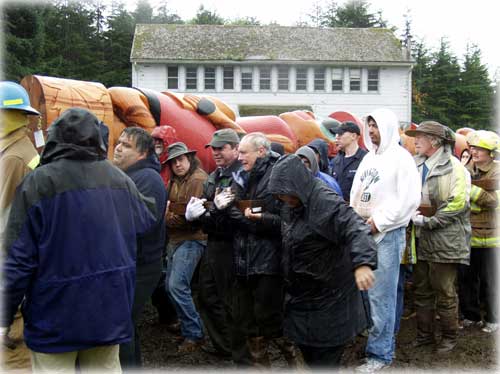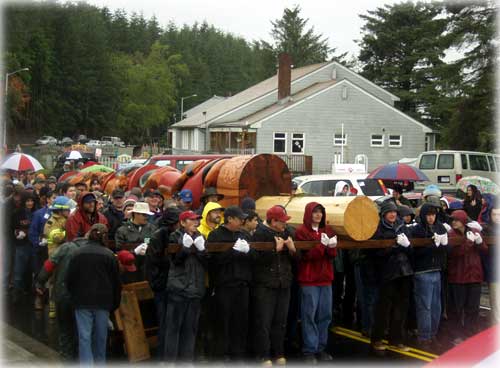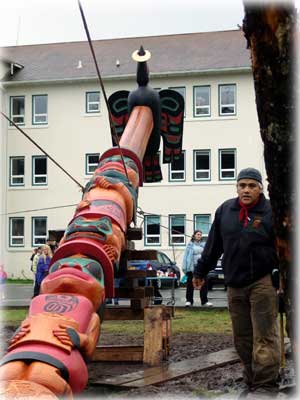 Kootéeyaa Project Wellbriety
totem pole raised
Kootéeyaa Project Wellbriety
totem pole raised
October 17, 2006
Tuesday AM
Sitka, Alaska - Hundreds of community members helped the SouthEast
Alaska Regional Health Consortium (SEARHC) raise the Kootéeyaa
Project Wellbriety totem pole during a ceremony Saturday, Oct.
14, in front of the SEARHC Community Health Services building
in Sitka. The totem pole has the Tlingit name Yei éek
kwa néix (which means, "you are
going to get well").
 SEARHC President/CEO
Ken Brewer, center with baseball cap, and SEARHC Vice President
of Community Health Services Mark Gorman, without hat, join about
140 community members as they help carry the Kootéeyaa
Project Wellbriety totem pole on Saturday, Oct. 14, 2006, in
Sitka, Alaska. The totem pole was commissioned by SEARHC, the
tribal health organization for the area, and it was carved by
Tlingit master carver Wayne Price.
SEARHC President/CEO
Ken Brewer, center with baseball cap, and SEARHC Vice President
of Community Health Services Mark Gorman, without hat, join about
140 community members as they help carry the Kootéeyaa
Project Wellbriety totem pole on Saturday, Oct. 14, 2006, in
Sitka, Alaska. The totem pole was commissioned by SEARHC, the
tribal health organization for the area, and it was carved by
Tlingit master carver Wayne Price.
Photograph Courtesy of Souteast Alaska Regional Health Consortium
(SEARHC)
The all-day ceremony required community participation. First,
a group of about 140 people used 4x4s to carry the 4,000-pound
pole from the carving shelter where Tlingit master carver Wayne
Price had been working on the pole since April. Once the pole
reached its place of honor on the lawn in front of the SEARHC
Community Health Services building, about 400 community members
pulled six ropes to lift the pole into place. The ceremony concluded
at the Hames Physical Education Center at Sheldon Jackson College
with speeches, Native dancing and a dinner featuring traditional
foods.
"It's been one of the
most extraordinary events of SEARHC, right up there with the
raising of the SEARHC flag when we took over the IHS (Indian
Health Service) service unit," said SEARHC President/CEO
Ken Brewer, referring to the day in 1975 when SEARHC was granted
control of its own health care. "It's a true symbol of our
culture being healthy, it really is."
"It really has been an
extraordinary day, with all this energy and all these smiling
faces reflecting the healthy theme of this pole," added
Jan Hill, Chair of the SEARHC Board of Directors.
 Volunteers slide a
sawhorse under the Kootéeyaa Project Wellbriety totem
pole so the roughly 140 community members carrying the pole can
take a break on Saturday, Oct. 14, 2006, in Sitka, Alaska. The
pole was being carried from the carver's shelter to its final
place of honor in front of the SEARHC Community Health Services
building. During the carving process, small groups of people
held healing circles to discuss different aspects of wellness,
such as drug and substance abuse, diabetes and cancer, then each
member of the healing circle got to make his or her own mark
on the pole.
Volunteers slide a
sawhorse under the Kootéeyaa Project Wellbriety totem
pole so the roughly 140 community members carrying the pole can
take a break on Saturday, Oct. 14, 2006, in Sitka, Alaska. The
pole was being carried from the carver's shelter to its final
place of honor in front of the SEARHC Community Health Services
building. During the carving process, small groups of people
held healing circles to discuss different aspects of wellness,
such as drug and substance abuse, diabetes and cancer, then each
member of the healing circle got to make his or her own mark
on the pole.
Photograph Courtesy of Souteast Alaska Regional Health Consortium
(SEARHC)
The Kootéeyaa Project totem represents the Native journey
to wellness, the SEARHC substance abuse and prevention treatment
programs, and the process of transformation to and the continuing
journey of "Wellbriety." Wellbriety is part of a national
movement that uses a Native journey to wellness - one that links
physical, mental, spiritual and emotional health - as part of
its process of healing the total person. Representatives from
White Bison, the group that fostered the national Wellbriety
movement, were on hand with their sacred hoop, the first time
the sacred hoop has been in Alaska.
The pole features a frond of
devil's club carved into the base. Devil's club, or S'áxt'
in Tlingit, is considered one of the most powerful medicinal
plants for the Tlingit, Haida and Tsimshian tribes that populate
Southeast Alaska. The devil's club plant has been incorporated
into the SEARHC logo and the Tlingit name for the SEARHC Mt.
Edgecumbe Hospital in Sitka is S'áxt' Hít.
 Tlingit elders Herman
Kitka and Herman Davis give the Kootéeyaa Project Wellbriety
totem pole the Tlingit name Yei éek kwa néix
before the pole was raised on Saturday.
Tlingit elders Herman
Kitka and Herman Davis give the Kootéeyaa Project Wellbriety
totem pole the Tlingit name Yei éek kwa néix
before the pole was raised on Saturday.
Photograph Courtesy of Southeast Alaska Regional Health Consortium
(SEARHC)
Atop the base, a medicine woman kneels as she holds a birch basket
full of medicinal plants, including rose hips, soapberries, Hudson
Bay tea and currants. Next comes a shaman with his partner spirit
wolf, and the shaman holds a pair of Tlingit rattles. Above the
shaman is an open space, which represents the daylight of recovery.
A raven - the creator, in Tlingit lore - is on the top of the
pole and the raven holds a copper ring in its beak, which represents
the moon.
 Tlingit master carver
Wayne Price checks the rigging before the Kootéeyaa Project
Wellbriety totem pole is lifted into place. It took about 400
community members tugging on six ropes to lift the 4,000-pound
pole into place.
Tlingit master carver
Wayne Price checks the rigging before the Kootéeyaa Project
Wellbriety totem pole is lifted into place. It took about 400
community members tugging on six ropes to lift the 4,000-pound
pole into place.
Photograph Courtesy of SEARHC
|
"The design of this pole
reflects very old, traditional Tlingit values. The shaman, the
medicine woman, each of these is symbolic of Tlingit culture,"
Price said. "Culture and art have the ability to heal people,
to recover. It's a very healthy path people can take to getting
well."
During the pole's carving process,
groups of about 10 community members apiece formed circles of
healing. Each healing circle met to discuss a different aspect
of Wellbriety, such as alcohol and substance abuse, diabetes
or cancer. Then each person in the healing circle got to make
his or her mark on the pole.
"Words cannot describe
how I felt the day of the pole raising," said Kootéeyaa
Project chairwoman Roberta Kitka, a drug and alcohol treatment
specialist for SEARHC. "It was a very emotional day for
me to see all the good people who showed up to help. The eagles
were singing as the pole went up. Elders were in awe at the design
and detail of the pole. An elder commented, 'I thought I was
just coming to a pole raising, but this was so much more than
that.' Gunalcheesh to all the helpers!"
The Kootéeyaa Project's
mission statement is "to promote and demonstrate the natural
partnership between health and Alaskan cultures through the embodiment
of wellness, community collaboration and traditional values."
The Kootéeyaa Project received funding from the J.M. Murdock
Charitable Trust.
Source of News & Photographs:
Southeast Alaska Regional Health
Consortium (SEARHC)
www.searhc.org
E-mail your news &
photos to editor@sitnews.us
Publish A Letter on SitNews Read Letters/Opinions
Contact the Editor
SitNews
Stories In The News
Ketchikan, Alaska
|




